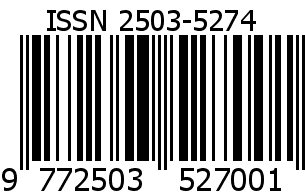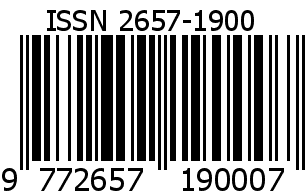UTILIZATION OF CROSS-SECTION DIGITIZATION FROM 2D GEOELECTRIC RESULTS TO VISUALIZE THE SHAPE OF THE SAUNG CAVE CAVITY AS A GEOEDUCATIONAL POTENTIAL
Abstract
This study was conducted to detect and visualize the presence of cave cavities in the Saung Penggembur Cave area, Central Lombok, to support efforts to develop the area as a geo-educational facility. The method used was 2D resistivity geophysics with a Wenner configuration on four measurement lines. The data obtained were processed using Res2dinv software to produce subsurface cross-sections. The cross-section results from the four measurement lines showed continuously increasing values with increasing depth. These results were then digitized to visualize the cave's shape based on the obtained resistivity values. Cave cavities were assumed to have high resistivity values ranging from 725 to 1000 Ωm. These values were found at a depth of 2.5 m, or even deeper. These results indicate that the presence of cave cavities varies at each point. This condition is supported by field observations showing the presence of a hole above the surface. These results are interpreted as an indication of the presence of cavities or cave passages. This study provides an initial overview of subsurface geological conditions and demonstrates the efficacy of the 2D geophysical method in non-invasively identifying hollow zones. These findings are important for supporting further geological exploration, the preservation of karst areas, and the development of geoeducation's potential as a natural laboratory.
Downloads
References
2 Antić A, Tomić N, Marković S. 2019. Karst Geoheritage and Geotourism Potential in the Pek River Lower Basin (Eastern Serbia). Geographica Pannonica. 23(1): 32.
3 Erlandi M, Kurniawan S, Rizqi AHF, Nadip M. 2023. Fasies dan Lingkungan Pengendapan Karbonat di Gua Gadung Desa Pundung Sari Kecamatan Semin Kabupaten Gunung Kidul Daerah Istimewa Yogyakarta. 18: 327.
4 Elwis K, Syaputra M, Sari P, Kehutanan J. 2025. Species Identification and Morphometric Analysis of Bats (Chiroptera) in Saung Cave, Pengembur Village, Central Lombok. Jurnal Biologi Tropis. 25: 82.
5 Pagán PM, Ortiz DG, Crespo TM, Manteca JI, Rosique M. 2013. The Electrical Resistivity Tomography Method in the Detection of Shallow Mining Cavities. A Case Study on The Victoria Cave, Cartagena (SE Spain). Eng Geol. 156: 1.
6 Ardi ND, Mimin I. 2009. Profil Resistivitas 2D Pada Gua Bawah Tanah dengan Metode Golistrik Konfigurasi Wenner-Schlumberger (Studi Kasus Gua Dago Pakar, Bandung). Jurnal Pengajaran MIPA. 14(2): 79.
7 Hutomo RS, Khumaedi, Yulianto A. Investigasi Gua Bandung di Kawasan Pegunungan Karst Sukolilo Pati dengan Menggunakan Metode Geolistrik. vol 52016.
8 Yusuf K, Ekayani IAPH, Marsiti CIR. 2024. Potensi Objek Wisata Desa penggembur Kecamatan Pujut Lombok Tengah sebagai Desa Wisata. Jurnal Bosaparis: Pendidikan Kesejahteraan Keluarga. 15(01): 42.
9 Agustin ALD, Effendi MH, Tyasningsih W, Khairullah AR, Tirtasari K, Moses IB, Ayuti SR. 2024. Cave Bats as Carriers of Extended Spectrum Beta-lactamase Produced by Escherichia coli from the Island of Lombok, Indonesia. Indian J Anim Res. (Of): 1.
10 Fajri SR, Al Idrus A, Hadiprayitno G. 2014. The Richness of Bat Species Order Chiiroptera in the Southern Caves of Lombok Island West Nusa Tenggara. Bioedukasi. 7(2): 5.
11 Tičar J, Tomić N, Breg Valjavec M, Zorn M, Marković SB, Gavrilov MB. 2018. Speleotourism in Slovenia: Balancing Between Mass Tourism and Geoheritage Protection. Open Geosciences. 10(1): 344.
12 Farabollini P, Bendia F. 2022. Frasassi Caves and Surroundings: A Special Vehicle for the Geoeducation and Dissemination of the Geological Heritage in Italy. Geosciences (Switzerland). 12(11): 1.
13 Otero DZ, Chaparro JEG, Rangel DSB, Reyes CAR, Alarcón OMC. 2019. Geoconservation of underground ecosystems in Santander (Colombia) from Geotourism and Geoeducation Strategies. International Journal of Hydrology. 3(4): 317.
14 Telford WM, Geldart LP, Sheriff RE, Keys DA. 1976. Applied Geophysics. Cambridge University Press. .
15 Thamodi AAR, Kumara BASC. 2025. A Geological Study on the Importance of a Limestone Cave (with Special Reference to Waulpane Cave in Ratnapura District). South Florida Journal of Development. 6(3): 01.
16 Barbosa MR, Braga MA, Da Gama MFP, De Paula RG, Brandi IV, De Oliveira Dias LS. 2020. Electrical Resistivity Contrasts in The Geotechnical Assessment of Iron Caves, N4EN Mine, Carajás, Brazil. Geophysics. 85(1): B1.
Copyright (c) 2025 Jurnal Fisika : Fisika Sains dan Aplikasinya

This work is licensed under a Creative Commons Attribution-NonCommercial-ShareAlike 4.0 International License.
Jl. Adisucipto, Penfui-Kupang, Lasiana, Klp. Lima, Kota Kupang, Nusa Tenggara Timur., Indonesia
This work is licensed under Attribution-NonCommercial-ShareAlike 4.0 International (CC BY-NC-SA 4.0)
 Ika Umratul Asni Aminy(1*)
Ika Umratul Asni Aminy(1*)
















